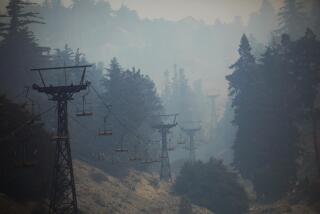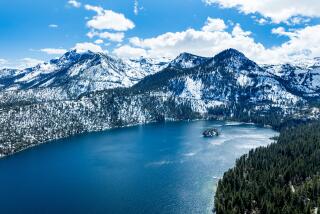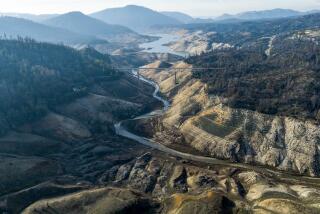Skiers, resorts cast hopeful eye toward El Niño
Forecasts of an approaching El Niño winter have ski resort operators dreaming of the kind of snowy peaks that were a common sight in California before a four-year drought dried up the state’s $3-billion ski industry.
But optimistic talk of powder-covered slopes may not be enough to persuade skiers to buy expensive resort passes, especially after being disappointed by limited runs and broad swaths of exposed dirt the last several seasons.
So this year resorts are trying something new: offering incentives if this year’s predicted El Niño turns out to be a dud. They range from simple discounts to guarantees that give pass holders credit toward skiing next winter.
Some annual passes even can be used at affiliated resorts where snow is more consistent, including one Colorado-based operator that has expanded amid industry consolidation to extend its Lake Tahoe passes to resorts it owns in other states.
“This is a response to the conditions of the past several years,” said Michael L. Reitzell, president of the California Ski Industry Assn., a trade group that represents the state’s ski resorts. “This certainly could be a new trend.”
The worst drought in California history has put pressure on ski resort operators to find new ways to boost resort visits, which have dropped by 40% since 2010. Over the last few years, resorts have installed zip lines, mountain bike trails and rope courses to turn their sun-dried mountainsides into year-round outdoor destinations.
But new predictions of an unusually wet winter could signal an avalanche of skiers in California. Or not.
The National Oceanic and Atmospheric Administration said that the chances of El Niño weather hitting the Northern Hemisphere this winter are about 95%, with about 85% chances that it will last into early spring.
“It’s looking like one of the biggest El Niño years ever,” said Daniel Pistoresi, a spokesman for Ski Lake Tahoe, a marketing group that is promoting skiing at nine resorts around the lake.
Early signs suggest skiers are buying annual passes in greater numbers.
Marianne Mahn, a retired software engineer and lifelong skier from Santa Barbara, is so optimistic that El Niño will bring great mounds of fluffy white flakes that she has bought passes for three resorts for this winter.
“I always have to think that way,” she said. “I love to ski.”
And at Mt. Rose Ski Tahoe’s annual Labor Day sale, the resort sold 300 more passes than last year. The resort typically sells about 10,000 passes per year.
Infographic: 195 drought maps reveal just how thirsty California has become
But many skiers remain cautious, saying they are not ready to book extended trips until they see snow falling on the slopes.
“Skiers tend to be well-versed and researched on El Niño,” said Bruce Lee of Redondo Beach, who has been skiing for 30 years. “If temperatures don’t cooperate you are going to get rain, not snow.”
Members of several Southern California ski clubs say the drought has forced them to cut back on the number of annual ski trips they are planning for this winter. Many groups have also stopped renting buses for such excursions because unusually high cancellation rates are leaving the groups to pay for half-empty buses. Instead, the clubs now organize carpools.
“I don’t know how much snow we are going to get,” said Catherine Ohl, a longtime skier and president of the Pacific Rim Snow Sports Alliance, a San Diego-based ski and outdoor club. “Is it going to be enough?”
Water and Power is The Times’ guide to the drought. Sign up to get the free newsletter >>
Ski resort operators say they understand the hesitation to commit to an annual pass.
“The past few seasons have been tough and visitors are apprehensive about purchasing a season pass,” said John McColly, chief marketing officer for Mountain High in Wrightwood. “We want to give them the confidence they need to make that purchase and know they got a good value no matter what the weather does.”
Starting this year, the Mountain High annual pass gives holders credit toward a pass in the 2016-17 season if they are only able to ski four or fewer days this winter. If pass holders skied two or fewer days, they get 50% off a pass next winter; three or four days of skiing warrants 25% off.
Squaw Valley and Alpine Meadows in Lake Tahoe unveiled this year a “worry-free guarantee” that gives certain pass holders up to four days of credit toward the purchase of a 2016-17 pass if they only get to ski less than five days.
To draw in apprehensive skiers, Mt. Rose Ski Tahoe resort began last year to offer an annual pass that can be used one weekday out of each week for $229 for the entire season — nearly 50% cheaper than the pass valid for seven days per week.
See the most-read stories this hour >>
The California drought has intensified as the ski industry has undergone a dramatic consolidation trend over the last decade, with giant resort operators such as Vail Resorts Inc., Powdr Corp., Boyne USA Inc. and Aspen Ski Co. buying up independent resorts throughout the country.
Vail Resorts, based in Broomfield, Colo., owns or operates 11 of the nation’s most popular ski resorts and recently completed its first international purchase in New South Wales, Australia. Such giant resort operators are taking advantage of their size to market to snow-hungry skiers in California.
Vail Resorts, which owns Heavenly, Northstar and Kirkwood resorts in the Lake Tahoe area, added a new wrinkle this season to its Tahoe annual pass, which previously offered access to the three resorts for about $500 for adults. Starting this season, the pass also includes five days of skiing at six Vail resorts in Colorado and Utah, where snowfall is more consistent.
“The emphasis is that you have options now,” Vail spokesman Russ Pecoraro said of the Tahoe pass. “We definitely want people to get the most value out of their passes.”
The consolidation trend has even hit Southern California.
The operators of Mammoth Mountain and June Mountain in the Eastern Sierras paid $38 million last year to purchase the Bear Mountain and Snow Summit resorts near Big Bear Lake in the San Bernardino Mountains. The operators of those resorts are now promoting the sale of a “Cali4nia Pass” that can be used at all four mountains, increasing the chance that skiers will find at least one peak covered in snow.
“It’s really a killer deal for Southern Californians,” said Chris Riddle, a spokesman for Bear Mountain Resorts.
Twitter: @hugomartin
ALSO:
Salton sea faces catastrophic future, toxic dust storms, officials say
California’s drought consequences are snowballing, so to speak
More to Read
Inside the business of entertainment
The Wide Shot brings you news, analysis and insights on everything from streaming wars to production — and what it all means for the future.
You may occasionally receive promotional content from the Los Angeles Times.










